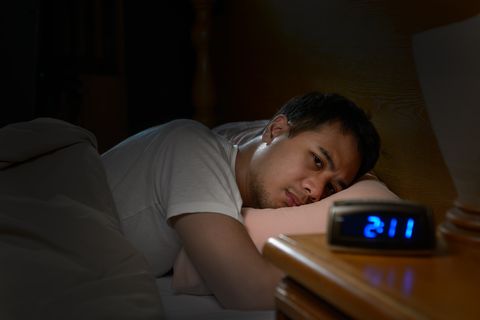
You’re probably familiar with the National Sleep Foundation guidelines suggesting that people get approximately 7 to 9 hours of sleep each night. You also probably know that the human body requires regular sleep so it can perform critical physiological functions, such as muscle/tissue repair, memory consolidation, and hormone synthesis.
But let’s be honest: every so often, you need to stay awake for an extended period of time, whether you’re cramming for an exam or working on a deadline. So how long is a person actually physically able to go without sleeping?
Randy Gardner currently holds the “world record” for sleep deprivation at 11 days, 25 minutes. But according to W. Christopher Winter, MD, president of the Charlottesville Neurology and Sleep Medicine clinic, there’s reason to be skeptical about this record: “investigators freely admit he was having near constant ‘microsleeps’ [brief periods of sleep that last just a few seconds] during the experiment,” he told MensHealth.com.
Even if someone does manage to stay up for days at a time, it’s not great for your mental health. In 1959, for instance, a radio presenter named Peter Tripp decided to broadcast his show from the middle of Times Square for 201 hours straight to raise money for a children’s foundation. By day three, Tripp had begun acting out, cursing at people around him, and hallucinating spiders. Although he managed to finish the experiment and recover shortly after, his family members said he was never quite the same again.
There have been many viral internet stories about people who claim they’re not sleeping at all or who only get an hour of sleep per night. But Winter says these stories are probably inaccurate. “Many people think that they are not sleeping, and do not believe their doctors (or their Fitbits) who say they are,” says Winter. In other words, although people may believe they’re only getting an hour or so of sleep per night, the truth is that they’re likely sleeping without knowing it, even if just for a few minutes.
The truth is, it’s almost physically impossible to stay awake for days at a time, because your brain will essentially force you to fall asleep. Winter says that as much as you may try to force yourself to stay awake, eventually your brain gets fixated on sleep and “at a certain point there’s not much you can do about it.”
Additionally, there are numerous health risks associated with long-term lack of sleep. Michael J. Breus, PhD, sleep specialist and founder of the website the Sleep Doctor, says that lack of sleep is linked to side effects such as weight gain, decreased sexual arousal, and a weakened immune system. You’re also more prone to accidents, especially if you’re behind the wheel of a car.
So while there is no set number of hours for how long a person can stay awake, this experiment is probably not worth trying, says Winter.
“My record was 48 hours and I was hallucinating the sound of my mom whispering to me by the end,” he says. “Not fun!”
Source: Read Full Article